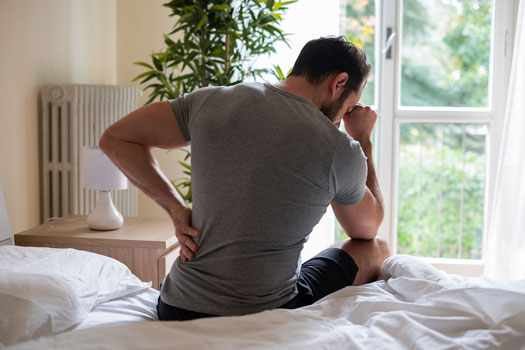
Pain from an irregularly shaped or positioned spinal disc can vary in intensity or reach a point where it naturally subsides over time, which is also true with a herniated disc. It's also not so out of the ordinary for certain things to aggravate the affected disc even if your symptoms are usually manageable. Today, we're talking about some of the things likely to make a bulging disc worse so you'll know what to avoid when possible.
Forceful Actions like Coughing
Sudden, forceful actions like this can trigger pain spikes if you have a bulging spinal disc. The same thing can happen with sneezing and strong outbursts of laughter. Granted, it’s not practical or realistic to avoid all actions of this nature. What you can do, though, is make an effort to remain as still and steady as possible when involuntary forceful actions occur.
Poor Posture
Certain posture habits can make a bulging disc worse. Generally, this applies to anything that throws off your spine's natural alignment or places too much pressure on the affected area where the disc is located. Minimize spinal disc pain spikes related to your posture by:
• Sitting up straight
• Not slouching to one side or the other
• Sleeping in positions that maintain your spine's natural alignment (avoiding stomach sleeping)
• Not excessively leaning forward
Long Periods of Sitting
A bulging disc, especially one in the lower back area, can become worse if you sit for too long. While you may need to sit for longer periods to do work, get into the habit of shifting your position periodically. Also, make an effort to get up to stretch, walk around, and move whenever you can.
Repetitive Movements
Making certain movements over and over can overstress soft tissues around a bulging disc enough to worsen discomfort. This is more likely to be the case with repetitive bending, twisting, lifting, or reaching movements. Instead, try to vary your motions and movements. For times when this isn't entirely possible, consider using lumbar belts or braces and other support devices.
Overly Strenuous Activities
Both herniated and bulging discs can be affected by activities that are too strenuous. If you regularly work out, avoid squat thrusts, leg presses, and similar routines that can overstress your spine and the affected disc. Even everyday activities like vacuuming, working in the yard, and doing laundry may worsen bulging disc pain. Be as cautious as possible with anything strenuous to minimize bursts of disc pain.
Unhealthy Diet Habits
Discomfort from a bulging disc could also become worse if your diet includes foods that contribute to inflammation, such as sugary snacks or fried foods. Improving your diet habits also helps your spinal discs get more beneficial nutrients, which plays a role in promoting the natural healing process.
Lack of Activity
Yes, overly strenuous activities should be avoided. However, too much rest isn't good for a bulging disc either. Find a happy medium with your level of activity by focusing on exercises and activities that strengthen your core muscle groups. What this does is ease the burden on the affected spinal disc, which can make it easier to keep bulging disc symptoms under control.
A bulging disc can burst to become a herniated disc. If you have a herniated disc that isn't responding to conservative treatment, a back surgery procedure called a discectomy may be the best option. Although this is generally a very successful procedure, having a large hole in the outer ring of the disc more than doubles the risk of needing another operation. A new treatment, Barricaid, closes this hole, and 95 percent of Barricaid patients didn’t undergo a reoperation due to reherniation in a 2-year study timeframe. This treatment is done immediately following the discectomy—during the same operation—and doesn’t require any additional incisions or time in the hospital.
If you have any questions about the Barricaid treatment, ask your doctor or contact us at 844-288-7474.
For full benefit/risk information, please visit: https://www.barricaid.com/instructions.


Comments